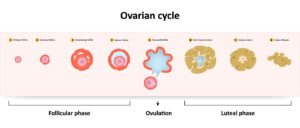An antral follicle is the final stage of development of the primordial follicles that are already present in the ovaries of baby girls when they are born. Too miniscule to be seen by the naked eye, there are roughly one million at birth, and these are all the potential eggs a woman is ever going to have. It may sound like a lot, but over the course of a reproductive lifetime, the number diminishes rapidly and in fact about 99% of the follicles are destined to never become mature eggs and disintegrate in the natural wastage known as atresia. Why is the antral follicle count important for IVF? Because this treatment needs multiple follicles, rather than the usual one, to mature and be ready for fertilisation.
In this article, we will look at the developmental stages of follicles, how antral follicles can be counted, and what is considered a normal antral follicle count by age.
What are antral follicles?
Follicles don’t become antral follicles until the very final stage of their development. They are extremely small to start with, measuring only 25 micrometres. This size renders them invisible, both to the naked eye and to any medical system capable of estimating their number. As they start their journey towards maturity, each day some follicles are triggered into growth by hormonal signals. On reaching the tertiary stage, the follicle develops a fluid-filled cavity known as the antrum. Measuring on average around 5 mm, it is now 200 times bigger than when it was a primordial follicle.
Follicles that have developed to the stage of having an antrum have now become antral follicles. They can be visualised via an ultrasound scan and. Although the remaining follicles in the ovaries can’t be physically counted, the number of antral follicles gives a very good estimation of the number of follicles left. That is, your ovarian reserve.
Antral follicles: stages of development
On the journey from primordial to antral follicle, which will culminate for just a few in becoming a mature egg, follicles go through a series of stages:
- Primordial follicle is the first stage of the follicles in a new-born child.
- Primary follicles result when, every day from puberty to menopause, a few primordial follicles become primary follicles.
- Secondary follicles feature the addition of theca cells and at this stage they begin to secrete hormones.
- Antral follicles, also known as tertiary follicles, have fluid-filled sacs known as antra and are now visible on an ultrasound scan.
- Graafian follicle is the last stage, when the egg inside the follicle is mature enough to ovulate. During a natural menstrual cycle, only one or occasionally two will reach this stage.
- Corpus luteum. No longer a follicle, the corpus luteum develops from the open sac that released the egg.

What is a normal antral follicle count by age?
It is well known that a woman’s ovarian reserve, that is the number of eggs she has left in her ovaries, declines with age. This, and the fact that the eggs which remain also decline in quality, explains why fertility reduces as we get older. Here is the range of what you could expect by age of a normal antral follicle count (AFC):
- Age 25 to 34, AFC from 10 to 13
- Age 35 to 40, AFC from 10 to 8.
- Age 41 to 46, AFC from 7 to 5.
However, if yours is higher or lower than expected according to your age, it does not necessarily mean that you are super fertile or particularly low on fertility potential. In some cases, a high AFC count can indicate polycystic ovarian syndrome (PCOS). If your count is low, it could mean that you have premature ovarian failure. Or, simply, you may not respond to fertility drugs as well as someone with a higher count. However, you could still get pregnant. This is why it’s important to have an experienced fertility specialist to interpret your results. He/she will be able to recommend the correct approach to treatment.
What is a good antral follicle count to get pregnant?
An ovarian reserve of 5 to 10 antral follicles is considered normal, and above 10 is classified as high. This would be an optimal starting point for evaluating pregnancy possibilities. However, a specialist will confirm this, considering other factors of female reproductive health.
Does low antral follicle count result in infertility?
If the count shows less than 5 follicles, this is considered low. However, a low ovarian reserve does not always mean infertility. Factors such as the woman’s age and egg quality must also be contemplated. Additionally, with assisted reproductive treatment, it is possible to become a mother despite having a low antral follicle count.
Does 1 follicle mean 1 egg in IVF?
As we explained in another article, a follicle does not always result in an egg, even if it is a follicle with optimal development. Its evolution, as well as that of the egg, depends on many factors and is not always predictable.
How is your antral follicle count tested?
The assessment count is made by ultrasound scan to check your ovarian reserve or as part of an IVF cycle. For example, in an IVF cycle we would conduct three or four scans to monitor follicle growth and development. We would also measure oestradiol blood levels. This helps us to evaluate not only the number of follicles, but also how healthy they are.
When you attend an IVI clinic for a fertility investigation, we would normally conduct an antral follicle test. It’s part of the process to help you decide on the most appropriate treatment. Alternatively, it could be carried out in the early stages of fertility treatment.
Why is the antral follicle count important for IVF?
During different types of fertility treatment, knowing the number of antral follicles available is important. Doctors can judge your likely response to the various options for treatment.
For an IVF cycle, your ovaries are stimulated to produce several mature follicles at the same time. A number of antral follicles between 10 and 15 is what doctors are aiming for.
When each of the eggs is aspirated from the follicles through a fine needle, it may turn out that not all of the follicles contained a mature and healthy egg. You therefore shouldn’t be too surprised if the final count of eggs available for fertilisation is lower than the number of antral follicles that you had to start with.
An assessment of your antral follicle count is just one of the many fertility techniques we at IVI have offered since our foundation in 1990. Since then, over 250,000 babies have been born with our help. You can get in touch using our online contact form. With a success rate among the best in the world, there’s a very good chance that we can help you too.





Comments are closed here.